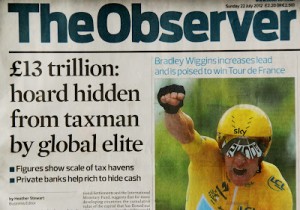 CBS News reports: “As Burger King eyes moving its headquarters to Canada to lower its tax bill, a Democratic senator is recommending a boycott of the burger joint.”
CBS News reports: “As Burger King eyes moving its headquarters to Canada to lower its tax bill, a Democratic senator is recommending a boycott of the burger joint.”
JAMES S. HENRY, jamesshelburnehenry at mac.com
Available for a limited number of interviews, Henry is former chief economist at the international consultancy firm McKinsey & Co. He is now senior fellow at the Columbia University Center for Sustainable International Investment and senior adviser with the Tax Justice Network, which earlier this year in their report “The Price of Offshore Revisited” estimated that total wealth in tax havens was between $21 trillion and 32 trillion dollars.
Henry is featured in the film “We’re Not Broke,” which tells the story of U.S. corporations dodging billions of dollars in income tax and is available on Netflix.
He said today: “You now have 100 major U.S. companies looking at ‘inversions’ like what Burger King is doing. This deal is a tax dodge by a Brazilian billionaire and other investors, it will hurt the U.S., Canada and such deals hurt virtually everyone else. These deals exposes domestic companies to competitors that are not paying substantial taxes.
“Contrary to some analysts, the Miami-based Burger King’ deal for Canada’s Hortons WOULD shift BK to Canada for tax purposes. BK is saying that that the deal would not ‘materially effect’ its effective U.S. tax rate of 27 percent, given that Canada’s ‘corp tax rate’ is ‘26.5 percent.’
“But given Canada’s effectively territorial corp income tax, plus its generous tax treaties with havens like Barbados, there’s a strong possibility that this deal could ultimately lead to a U.S. tax rate on Burger King’s entire U.S. income that is closer to zero than to 27 percent.
“Since Canada has a territorial corporate income tax it also does not benefit from this deal: the U.S. IRS will lose, but Canada is already not collecting any taxes on BK’s non-Canadian income. And it does lose yet another outstanding domestic company to rapacious global vultures.” See: “Tim’s + BK = $ for Canada right? …. Wrong! (in one table).”
Forbes writes: “The Burger King inversion deal is being driven by Jorge Paulo Lemann, Brazil’s richest man and co-founder of 3G Capital, the private equity firm that holds a majority stake in Burger King.”
Says Henry: “I’ve met Lemann and he made his fortune in the Brazil privatization wave of the 1990s — it was like Russia’s disastrous privatizations, riddled with corruption. Brazil sold assets for $98 billion and gave $99 billion in tax benefits — they actually lost money on selling off assets. Now, Lemann goes around like some business genius, but he’s just a scam artist. It’s not business, it’s tax dodging. Brazil’s tax system, inspite of recent presumably progressive administrations, has a very regressive tax system — the top 10 percent of Brazilians pay lower share than the bottom 50 percent. Lemann probably doesn’t pay any taxes in Brazil.
“It’s been tech companies and pharmaceutical companies that have lead the charge on these schemes. Apple last year off shore revenue paid 1 percent in taxes — they funnel their profits through their Irish subsidiary and then through the Bahamas. GE’s effective tax was zero. Now it’s getting into retail.
“So these companies do business in the U.S., they benefit from the airports, hospitals, police, fire, education. The rest of us pay for the military. Some of them are even federal contractors — they don’t pay taxes but they make money directly from our national coffers.
“Some are even using this to push for a tax repatriation holiday or a gutting of the corporate income tax. Both of these would be a disaster. When there was a repatriation holiday in 2004, 90 percent of the benefit went to Pfizer and they then laid off workers.
“And gutting the corporate tax rate would not only be horrible for us in the U.S., it would be a disaster for poor countries. It’s a race to the bottom. In Africa, you have countries that have effective negative tax rates. Instead of collaborating on tax collection across countries — they’re competing to go lower and lower.
“And all this is being driven by the fact that the corporate lobby doesn’t discriminate. Both establishment parties have been on the take and that’s why you have so little leadership on this issue.”